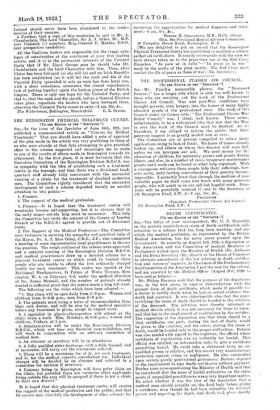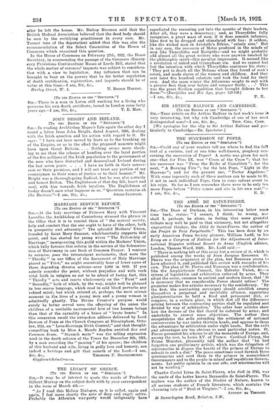DEATH CERTIFICATES.
[To THE EDITOR OP THE " SPECTATOR."1 SIR,—T110 letter of your correspondent, Mr. C. J. Reynolds, on the present unsatisfactory state of death certification calls attention to a reform that has long been wanting, and one which the medical profession, as represented by the British Medical Association, has for many years pressed upon the Government. So recently as August 3rd, 1920, a deputation of the Association and the Committee of medical Members of Parliament waited upon the Minister of Health (Dr. Addison) and the Home Secretary (Mr. Shortt) at the Ilouee of Commons to advocate amendment of the law relating to death certifica- tion and coroners' inquests. As Chairman of the Parliamentary Sub-Committee of the Association I put the case for the reform, and am reported by the Medical Officer (August 21st, 1920) to have said as follows :—
Mr. Bishop Harman said that the purpose of the deputation was, in the first place, to express dissatisfaction with the present form of death certificate, which made it possible for a doctor to certify death when he had no actual evidence that death had occurred. It was objectionable aleo that the paper certifying the cause of death should be handed to tho relative,: of the deceased. The relatives were thereby informed of medical details which it was not necessary for them to know, and this led to the employment of euphemisms by the certifier. The suggestion of the deputation was that there should be a dual certificate; one part, stating the fact of death, would be given to the relatives, and the other, stating the cause of death, would be handed only to the proper authorities. Reform was also needed with regard to the registrar, the official whose certificate of registration was an authority for burial. This official was entitled, on information only, to give a certificate permitting burial. He could take a statement from an un- qualified person or relative, and this meant very unsatisfactory protection against crime or negligence. He also commented upon certain purely professional grievances: Doctors objected to the requirement to sign death certificates without payment. During some cross-questioning the Minister of Health said that he considered that the issue of burial authorities on the state- ments of unqualified practitioners was a very important matter. lie asked whether it was the view of the deputation that a medical man should actually see the dead body before giving a certificate, even though he had been attending the deceased person and expecting his death, and death took place shortly after he left the house. Mr. Bishop Harman said that the British Medical Association believed that the dead body should be seen by the certifying practitioner in every case. Mr. Turner (one of the deputation) added that this was also the recommendation of the Select Committee of the House of Commons which examined this question.
In the House of Commons on February 27th, 1922, the Home Secretary, in commending the passage of the Coroners (Emerg- ency Provisions Continuation) House of Lords Bill, stated that the whole matter of coroners' inquests was subject to considera- tion with a view to legislation. Any influence that can be brought to bear on the powers that be for better regulation of death certification, registration, and inquests should be of value at this time.—I am, Sir, &c.,
Har[eu Street, W. 1. N. BISHOP HARMAN.



































 Previous page
Previous page